The Benefits of Chatbots in Healthcare for Patient Support
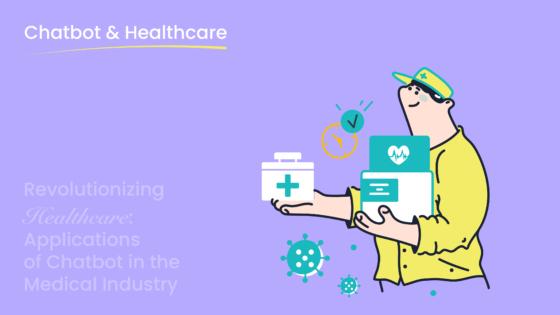
AI chatbots in healthcare transform patient care and engagement. Patients can access healthcare chatbots like Sobot AI for 24/7 support, quick answers, and guidance through hospital processes. Providers see reduced routine work, lower costs, and improved operational efficiency. Healthcare chatbots now reach over 400,000 patients at Saba Clinics, with 85% open rates and $3 billion in annual cost savings in the US.
| Metric | Value |
|---|---|
| Patient Reach | 400,000+ |
| Engagement Rate | 85% open, 41% reply |
| Cost Savings | $3B annually (US) |
| Monthly Chats | 8,400+ (Medical City Clinic) |
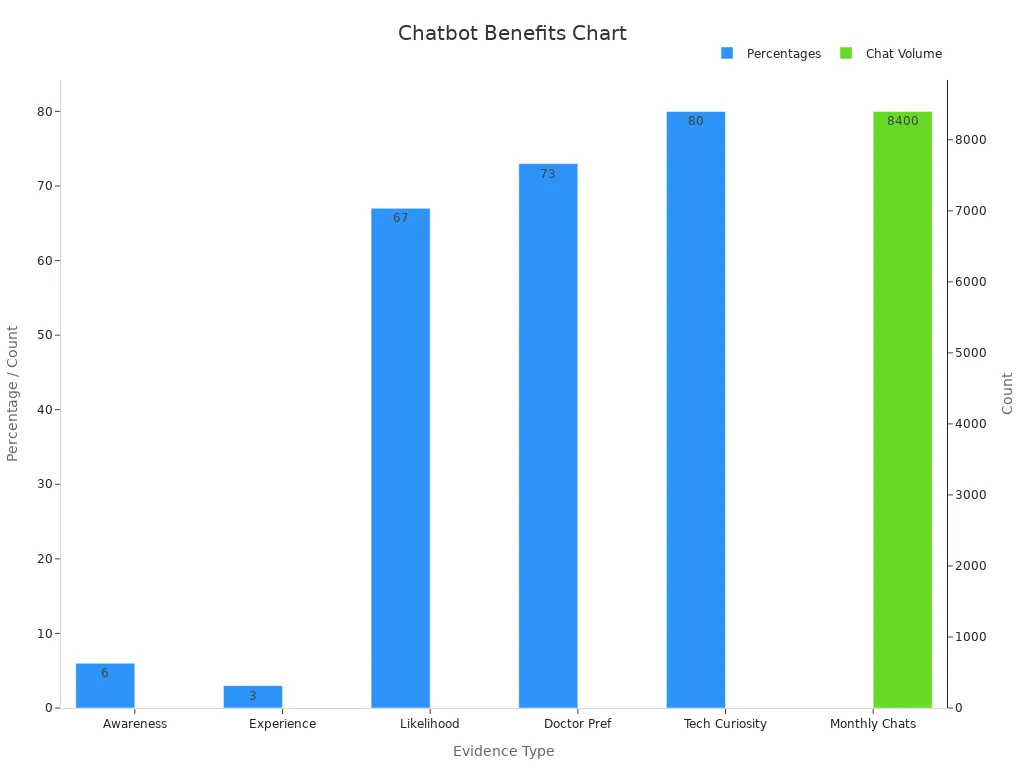
Healthcare chatbots, such as Sobot, give patients fast responses, automate scheduling, and support medication reminders. These benefits of chatbots in healthcare improve patient support, making care more accessible and efficient for both patients and providers. Sobot AI-powered chatbots enhance the patient experience and help providers focus on critical care.
Benefits of Chatbots in Healthcare
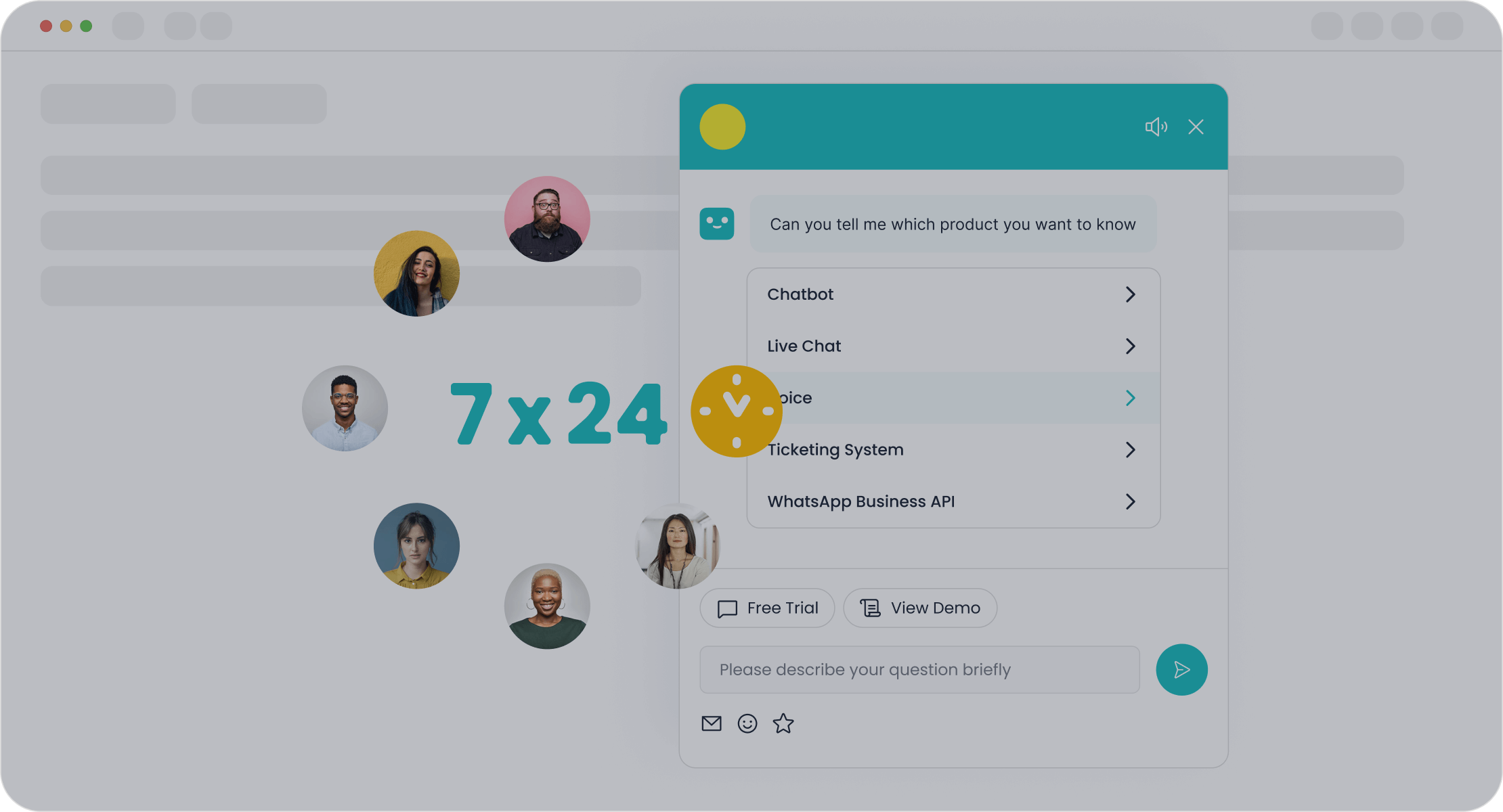
Patient Care
AI chatbots in healthcare give patients instant access to medical information and support at any time. This 24/7 availability means patients can get answers about symptoms, medications, or next steps without waiting for office hours. Healthcare chatbots like Sobot use advanced AI to provide accurate responses, drawing from a large knowledge base. For example, Ada Health’s chatbot identifies conditions with a 99% success rate, nearly matching human doctors. When doctors and chatbots work together, diagnostic accuracy can reach 97%.
| Diagnostic Measure | Human Doctors | Chatbot (Ada Health) | Combined Use (Doctors + Chatbot) |
|---|---|---|---|
| Condition Identification Rate | 100% | 99% | N/A |
| Diagnostic Accuracy | 82% | 71% | 97% |
Healthcare chatbots also monitor health parameters, such as blood pressure or glucose, and alert providers to abnormal values. This early intervention improves patient care and safety. Sobot’s AI-powered chatbots support chronic disease management by sending reminders and tracking health data, helping patients follow their care plans and improving patient experience.
Patient Engagement
Patient engagement increases when healthcare chatbots offer personalized support and education. AI chatbots in healthcare can tailor advice and reminders based on each patient’s history, making care more relevant and effective. Engagement rates with chatbot systems often exceed 90%, showing that patients respond well to these tools.
| Statistic / Example | Description |
|---|---|
| UCHealth | Uses chatbot 'Livi' to deliver personalized care plans and recommendations, enhancing patient engagement. |
| 78.6% | Patient reviews preferred chatbot replies over direct doctor replies, highlighting better kindness, tone, and detail in chatbot communication. |
| Northwell Health | Chatbots personalize conversations based on patient conditions, aiding in health tracking and reducing hospital visits/readmissions. |
Sobot’s multilingual and omnichannel chatbots make it easy for patients to connect through their preferred channels, such as WhatsApp or SMS. This approach supports a personalized patient experience and improves patient engagement. AI in patient engagement helps reduce anxiety, increase adherence to treatment, and boost satisfaction. Providers see improved patient engagement and better health outcomes.
Operational Efficiency
Healthcare providers benefit from AI chatbots by automating routine tasks, which saves time and reduces costs. Chatbots handle up to 60% of routine inquiries, freeing staff to focus on complex care needs. Sobot’s no-code setup allows healthcare teams to deploy chatbots quickly, without technical barriers.
| Metric Description | Numerical Evidence |
|---|---|
| Increase in patient engagement with NLP chatbots | 40% increase |
| Accuracy rate of BERT-based medical chatbot | 98% accuracy in managing medical questions |
| Proportion of routine inquiries handled by chatbots | Up to 60% |
| Projected global cost savings by AI chatbots by 2025 | $3.6 billion |
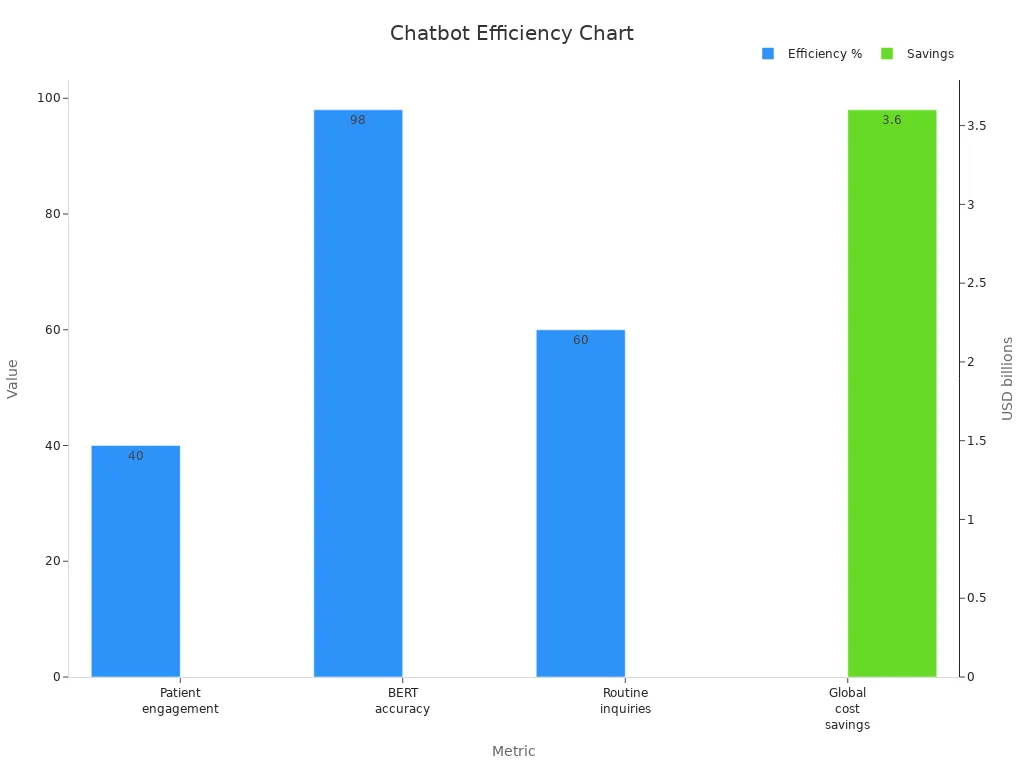
Providers using healthcare chatbots like Sobot report up to 40% higher efficiency and significant cost reductions. Sobot’s AI-powered chatbots operate across multiple channels, ensuring seamless communication and workflow integration. These benefits of chatbots in healthcare help providers deliver better care while optimizing resources and improving patient experience.
Real-World Applications

Appointment Scheduling
AI chatbots have changed how patients book and manage appointments in healthcare. Patients can schedule or modify appointments at any time, even outside office hours. Chatbots like Sobot offer 24/7 access, reducing the need for phone calls and long wait times. Clinics use chatbots to send automated reminders through SMS or email, which helps reduce no-shows by up to 60%. Mayo Clinic saw almost a 50% drop in missed appointments after using automated reminders. These systems also allow easy rescheduling, making the process smooth for both patients and staff. Integration with electronic health records ensures real-time updates and fewer errors. Sobot’s omnichannel support lets patients use their favorite apps, such as WhatsApp, for appointment scheduling. This improves operational efficiency and patient satisfaction.
- AI chatbots automate over 70% of administrative tasks in healthcare.
- 78% of physicians believe chatbots help with scheduling.
- Engagement rates with chatbot systems exceed 90%.
Symptom Assessment
Healthcare chatbots help patients check symptoms and decide on next steps. AI chatbots ask questions about symptoms and use large medical databases to give advice. This saves time for both patients and providers. Studies show that chatbots can gather important health information with high efficiency. For example, the Kahun platform reached a 0.74 efficiency rate, showing strong performance in collecting relevant data.
| Metric | Overall Value | Kahun Platform | Your.MD Platform |
|---|---|---|---|
| Recall Rate (all findings) | 0.32 | 0.51 | N/A |
| Efficiency Rate (findings/questions) | 0.46 | 0.74 | 0.69 |
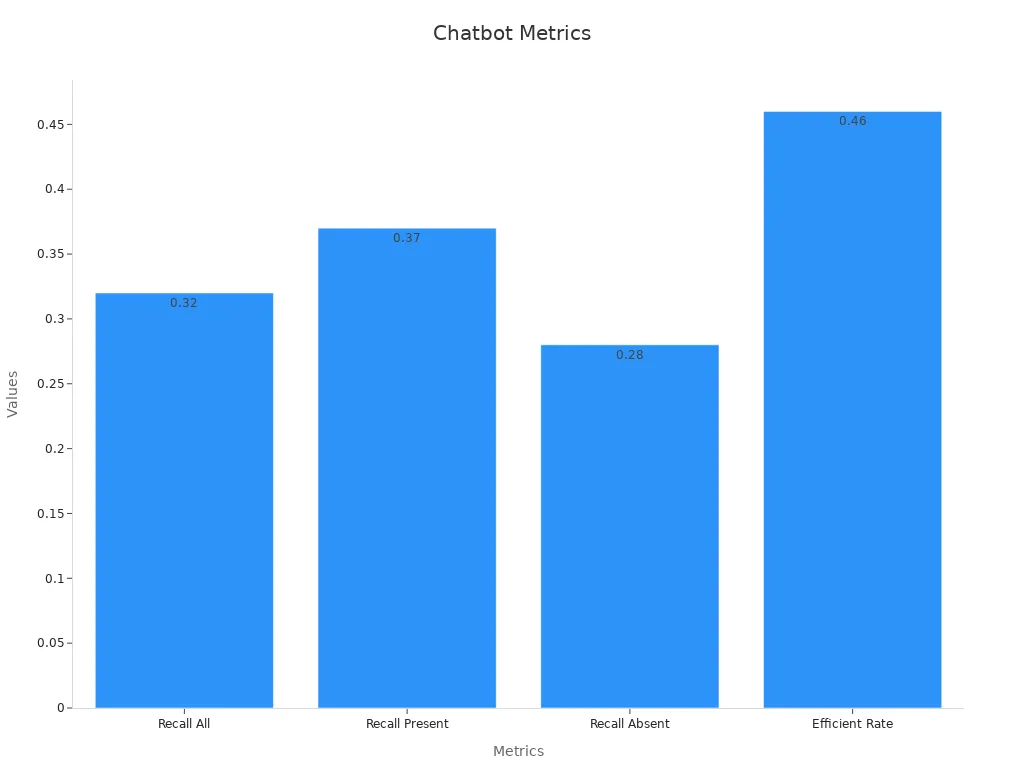
Sobot’s AI chatbots support symptom assessment by providing instant responses and guiding patients to the right care. This improves early detection and helps with support for chronic disease management.
Medication Reminders
Medication reminders are a key chatbot use case in healthcare. AI chatbots send personalized alerts to help patients remember to take their medicine or refill prescriptions. These reminders improve medication adherence and reduce health risks. Chatbots like Sobot can answer questions about dosage and side effects, supporting continuous care. Platforms such as AiCure and Memora Health show that regular reminders and check-ins increase patient engagement and help providers track adherence. Sobot’s AI chatbots in chronic disease care send timely reminders and collect feedback, which helps doctors adjust treatment plans. This leads to better outcomes for patients and supports mental health support as well.
Agilent, a leader in life sciences, used Sobot’s AI chatbot to handle routine inquiries and appointment scheduling. This led to a sixfold increase in efficiency and a 25% reduction in costs. Agilent’s customer satisfaction score reached 95%, showing the real impact of AI chatbots in healthcare.
The healthcare chatbot market is growing fast, expected to reach $431.47 million by 2028. More than 68% of healthcare organizations now use AI chatbots, and experts expect these tools to handle up to 75% of patient queries in the future. These real-world applications show how chatbots improve care, save time, and make healthcare more accessible.
Integration with Healthcare Systems
EHR and Patient Portals
Healthcare systems often use electronic health records (EHR) and patient portals to manage information. AI chatbots now connect with these tools to help patients and providers. When chatbots link to EHRs, they can automate appointment scheduling, send medication reminders, and help with chronic disease management. Patients get instant answers and reminders at any time. This support improves patient communication and helps people follow their care plans. Studies show that chatbots in patient portals make users feel more informed and reduce security worries. AI chatbots also help providers by lowering the time spent on paperwork and making data collection easier. These changes lead to better decisions and improved healthcare outcomes.
Multichannel Communication
AI chatbots support multichannel communication in healthcare. Patients can talk to chatbots on websites, mobile apps, WhatsApp, or SMS. This flexibility means patients get help where they feel most comfortable. Sobot’s AI chatbots offer omnichannel support, so conversations can move from one platform to another without losing information. This seamless experience improves patient engagement and satisfaction. Data shows that chatbots increase response speed, boost user engagement, and raise customer satisfaction scores. For example, some companies saw a 400% increase in sales pipeline after using chatbots across channels. In healthcare, this means faster answers and more consistent patient communication.
- Chatbots enable cross-channel conversations, keeping the same tone and information everywhere.
- AI chatbots provide 24/7 support, making healthcare more accessible for everyone.
Supporting Healthcare Teams
AI chatbots help healthcare teams work better. They handle routine questions, manage appointments, and send reminders. This support lets staff focus on complex care. Hospitals using chatbots report a 25% drop in readmissions and a 15% decrease in wait times. Patient interactions also rise by 30%, showing better engagement. Sobot’s AI chatbots integrate with healthcare systems to streamline workflows and reduce the burden on staff. These improvements help providers deliver better care and improve patient outcomes.
| Metric Description | Numerical Evidence | Impact on Healthcare Teams |
|---|---|---|
| Reduction in hospital readmissions | 25% decrease | Better chronic condition management |
| Increase in patient interactions | 30% increase | Improved engagement and care adherence |
| Reduction in consultation wait times | 15% decrease | Faster access to care |
Note: Ongoing innovation and strong policies help ensure that chatbots remain safe and effective in healthcare.
Addressing Challenges
Data Privacy
Healthcare chatbots handle sensitive patient information. Protecting this data is a top concern. Recent years have seen major data breaches, such as the British Airways incident and a healthcare breach that affected 11 million patients across 20 states. These events show the risks of unauthorized access and data misuse. Regulations like HIPAA and GDPR require strict controls on electronic health information. Organizations use encryption, secure authentication, and regular audits to protect patient data. Multifactor authentication can prevent almost all cyberattacks. Sobot chatbots follow best practices by using strong encryption, secure data transmission, and clear consent options. They also support data minimization and anonymization, which help reduce the risk of breaches. User education and transparency remain important for building trust in chatbots.
Accuracy and Reliability
Patients and providers rely on chatbots for accurate information. Studies show that some AI chatbots, like ChatGPT-4, reach up to 78% accuracy in patient education. However, errors can still occur, especially with complex medical questions. Experts recommend that healthcare teams verify chatbot responses against trusted clinical sources. New systems, such as MEDIC, use feedback from doctors and patients to improve chatbot reliability. Sobot chatbots use advanced AI and a large knowledge base to provide reliable answers. Regular updates and audits help maintain high standards. These steps ensure that chatbots support safe and effective care, including mental health support.
Human Touch
Many patients value empathy and personal connection in healthcare. While chatbots offer fast and efficient service, they cannot fully replace human understanding. Surveys show that 67% of people feel technology can reduce meaningful connections. The best approach uses chatbots for routine tasks and lets human agents handle complex or sensitive issues. Sobot chatbots use natural language processing to make conversations feel more personal. When needed, they can transfer patients to human staff for extra support. This balance helps healthcare providers deliver both efficiency and compassion.
Implementing Chatbots for Patients
Assessing Needs
Healthcare organizations should start by understanding what their patients need from chatbots. Teams often use frameworks like the Technology Acceptance Model (TAM) to check if patients can use digital tools. They look at age, language, device access, and privacy concerns. Hospitals also gather feedback from focus groups to learn about patient experiences and challenges. Common needs include easy appointment scheduling, medication reminders, and quick answers to health questions. The table below shows key criteria for needs assessment:
| Needs Assessment Criteria | Description |
|---|---|
| Chatbot Goals and Target Audience | Define the main purpose and who will use the chatbot |
| Key Performance Indicators (KPIs) | Track metrics like satisfaction, task success, and time to resolution |
| Usability and Acceptance | Ensure patients can use the chatbot easily and feel comfortable |
| Integration Capabilities | Confirm the chatbot works with current hospital systems |
| Continuous Improvement | Plan for regular updates based on patient feedback and usage data |
Choosing Solutions

Selecting the right chatbot solution is important for patient care. Healthcare leaders should choose chatbots designed for medical use and that follow privacy laws like HIPAA. The chatbot should understand natural language and know when to connect patients with human staff. Integration with electronic health records and appointment systems helps chatbots provide real-time support. Sobot offers an AI-powered chatbot that supports multiple languages, works across channels like WhatsApp, and requires no coding to set up. Hospitals should ask questions such as: What problem does the chatbot solve? How does it protect patient data? Can it grow with new features? Real-world examples show that hospitals using chatbots for appointment scheduling saw patient satisfaction rise by 30%.
Tip: Always check if the chatbot can handle sensitive information securely and fits into existing workflows.
Training and Education
Training and education help both staff and patients use chatbots effectively. Teams should work together to teach the chatbot about medical topics and patient needs. Regular updates and feedback improve chatbot accuracy and reduce errors. Staff training should cover how to use the chatbot, answer patient questions, and handle privacy concerns. Patients need simple guides or videos to learn how to use chatbots for tasks like booking appointments or getting medication reminders. Studies show that hospitals with strong training programs see higher patient satisfaction and better chatbot performance. Sobot provides easy-to-use tools and reporting features, making it simple for teams to train and optimize their chatbot over time.
Chatbots in healthcare help patients get answers quickly, improve patient engagement, and support providers with daily tasks. Sobot Chatbot offers 24/7 support, multilingual options, and easy setup, making patient care more efficient. Studies show top chatbots reach up to 72% accuracy in multiple-choice questions, with moderate to high agreement among experts.
| Chatbot Type | Multiple-Choice Accuracy (%) | Free-Text Accuracy (%) |
|---|---|---|
| Top Chatbot | 72.15 | 36.71 |
| Multimodal Chatbot | 70.89 | 37.97 |
| Chatbot 5 | 68.35 | 37.97 |
Healthcare organizations should choose chatbots that fit their needs and keep checking performance. Regular updates help maintain high engagement and better patient outcomes.
FAQ
What are the main benefits of chatbots in healthcare?
Chatbots in healthcare provide 24/7 support, quick answers, and help with tasks like appointment scheduling. Sobot’s AI-powered chatbot improves efficiency by up to 70% and reduces costs by 25%. These tools make healthcare more accessible for patients and providers.
How do chatbots in healthcare protect patient privacy?
Healthcare chatbots use encryption and secure authentication to protect sensitive data. Sobot follows best practices for privacy and complies with regulations like HIPAA. Regular audits and user consent help keep patient information safe. Learn more about HIPAA
Can chatbots in healthcare handle multiple languages?
Yes. Many chatbots in healthcare, including Sobot, support multiple languages. This feature helps patients communicate in their preferred language, making care more inclusive and effective. Multilingual support increases patient engagement and satisfaction.
How do chatbots in healthcare improve medication adherence?
Chatbots in healthcare send reminders for medication and refills. Sobot’s chatbot can deliver personalized alerts and answer questions about dosage. Studies show that regular reminders increase adherence and help patients manage chronic conditions better.
What makes Sobot’s chatbot unique for healthcare providers?
Sobot’s chatbot offers omnichannel support, no-code setup, and real-time intent assistance. It handles routine queries, boosts conversions by 20%, and integrates with existing healthcare systems. Providers see higher efficiency and improved patient support with Sobot’s solutions.
Tip: Chatbots in healthcare can answer up to 60% of routine questions, letting staff focus on complex care.
See Also
Key Advantages of Using Chatbots On Your Website
Why Live Chat Offers More Benefits Than Email Support
Simple Steps To Add Chatbot Examples On Websites
